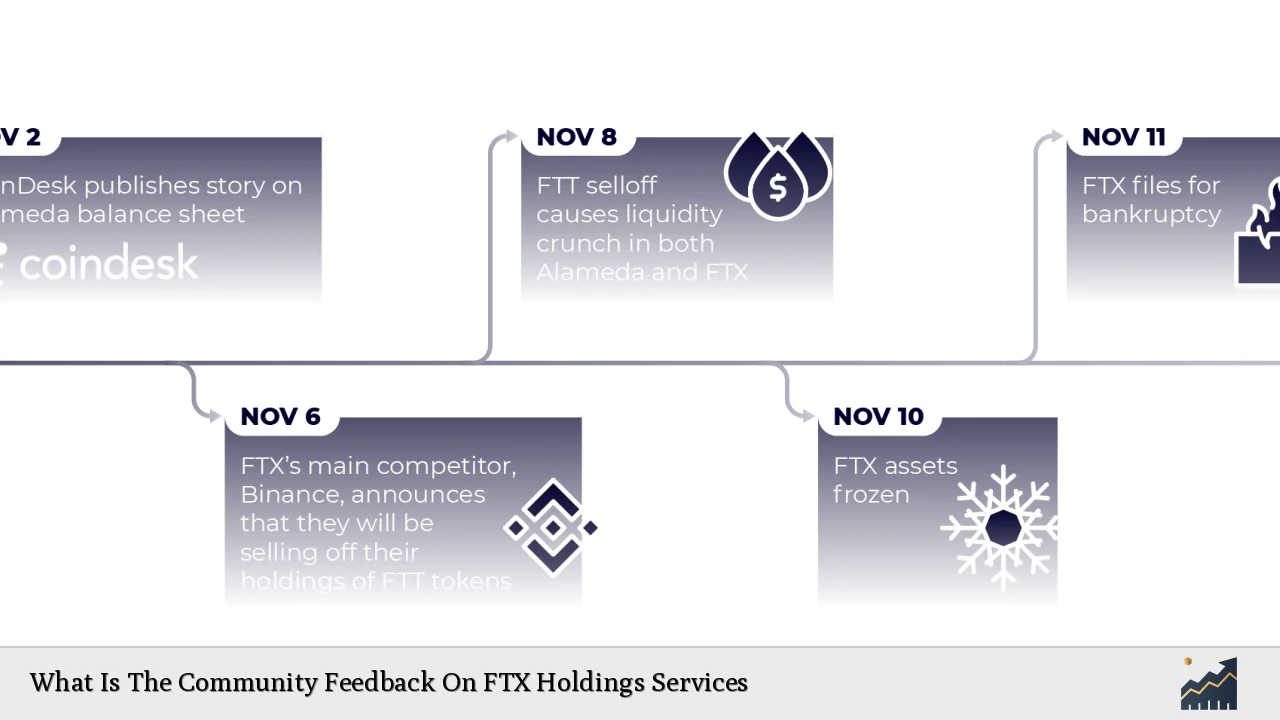The collapse of FTX, once a leading cryptocurrency exchange, has left a profound impact on investors and the broader financial community. Following its bankruptcy in November 2022, FTX’s reputation suffered significantly due to allegations of fraud and mismanagement. As the dust settles, community feedback on FTX’s services reveals a mixture of relief, frustration, and skepticism among former users and investors.
| Key Concept | Description/Impact |
|---|---|
| Customer Recovery | 98% of creditors are expected to receive approximately 118% of their claims due to asset recovery efforts by bankruptcy managers. |
| Withdrawal Issues | Many users reported difficulties withdrawing funds during the collapse, leading to significant financial distress. |
| Reputation Damage | The FTX brand has been tarnished, with many viewing it as a cautionary tale against investing in poorly regulated exchanges. |
| Market Volatility | The collapse triggered a wave of instability across the cryptocurrency market, affecting other exchanges and investor confidence. |
| Regulatory Scrutiny | FTX’s failure has led to increased scrutiny and calls for stricter regulations in the cryptocurrency sector. |
| Community Sentiment | User reviews indicate widespread dissatisfaction with FTX’s customer service and transparency before its collapse. |
Market Analysis and Trends
The fallout from FTX’s collapse has significantly influenced market dynamics within the cryptocurrency sector. Initially positioned as a robust competitor to established platforms like Coinbase, FTX’s rapid ascent was fueled by aggressive marketing strategies and high-profile endorsements. However, its downfall has prompted a reassessment of risk management practices across the industry.
Current Market Trends
- Increased Regulatory Oversight: Following FTX’s bankruptcy, regulatory bodies are pushing for stricter compliance measures within the cryptocurrency space. This includes enhanced transparency requirements for exchanges regarding their financial practices.
- Market Recovery: Despite the initial shockwaves caused by FTX’s collapse, the broader cryptocurrency market is showing signs of recovery. Major cryptocurrencies like Bitcoin have rebounded significantly since their lows in late 2022.
- Shift in Investor Sentiment: Many investors are now more cautious about engaging with cryptocurrency exchanges. There is a growing preference for platforms that demonstrate robust security measures and transparent operational practices.
Implementation Strategies
For individual investors and finance professionals looking to navigate the post-FTX landscape, several strategies can be implemented:
- Diversification: Investors should diversify their portfolios across different asset classes to mitigate risks associated with any single investment or platform.
- Due Diligence: Conduct thorough research on any exchange or investment opportunity. This includes reviewing regulatory compliance status, customer reviews, and financial health.
- Utilizing Established Platforms: Opt for well-established exchanges with a proven track record of security and customer service. Platforms that have undergone rigorous regulatory scrutiny are often safer choices.
Risk Considerations
Investing in cryptocurrencies remains inherently risky. The collapse of FTX serves as a stark reminder of potential vulnerabilities within the sector:
- Operational Risks: Exchanges may lack adequate risk management frameworks, leading to potential losses for investors.
- Liquidity Risks: Sudden market downturns can create liquidity crises for exchanges, impacting users’ ability to withdraw funds.
- Regulatory Risks: The evolving regulatory landscape means that exchanges may face sudden changes in compliance requirements that could affect their operations.
Regulatory Aspects
The aftermath of FTX’s failure has led to intensified discussions around regulatory frameworks governing cryptocurrency exchanges. Key considerations include:
- Stricter Compliance Requirements: Regulatory bodies are advocating for enhanced transparency measures to protect consumers and ensure that exchanges maintain sufficient liquidity.
- Licensing Frameworks: There is a push for standardized licensing procedures for cryptocurrency exchanges globally to ensure they meet specific operational criteria before being allowed to operate.
- Consumer Protection Initiatives: New regulations may focus on safeguarding consumer interests, including clearer guidelines on how exchanges handle customer funds.
Future Outlook
Looking ahead, the future of cryptocurrency exchanges like FTX hinges on several factors:
- Restoration of Trust: For any exchange to succeed post-FTX, it must prioritize rebuilding trust through transparent operations and robust security measures.
- Innovation in Regulation: As regulators adapt to the rapidly changing landscape of digital assets, innovative approaches will be necessary to balance consumer protection with fostering innovation in the industry.
- Market Adaptation: The cryptocurrency market will likely continue evolving as new technologies emerge. Exchanges that adapt quickly while prioritizing user security are more likely to thrive.
Frequently Asked Questions About Community Feedback On FTX Holdings Services
- What were the main issues faced by users during the FTX collapse?
Users reported significant difficulties withdrawing funds, unresponsive customer service, and unexpected fees. - How are customers recovering their funds from FTX?
The bankruptcy plan indicates that 98% of creditors will receive approximately 118% of their claims due to successful asset recovery efforts. - What impact did FTX have on other cryptocurrency exchanges?
The collapse led to increased withdrawals from other platforms and heightened scrutiny from regulators across the industry. - What lessons can investors learn from the FTX situation?
Investors should prioritize due diligence, diversify their portfolios, and choose well-regulated platforms for trading cryptocurrencies. - Are there any ongoing legal repercussions for FTX executives?
Yes, several top executives have faced legal actions due to alleged fraud and mismanagement related to customer funds. - How has investor sentiment changed post-FTX?
Investor sentiment has shifted towards caution, with many seeking more secure investment avenues and showing reluctance toward high-risk platforms. - What role do regulations play in preventing future collapses?
Stricter regulations aim to enhance transparency and accountability among cryptocurrency exchanges, potentially reducing risks for investors. - Will FTX relaunch its services?
No, following its bankruptcy proceedings, FTX announced it would not restart its exchange but would focus on liquidating assets to repay customers.
The community feedback on FTX Holdings Services encapsulates a complex narrative marked by significant challenges and emerging opportunities within the cryptocurrency landscape. As stakeholders navigate this evolving environment, lessons learned from past mistakes will be crucial in shaping a more resilient future for digital asset trading.

